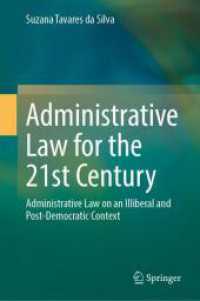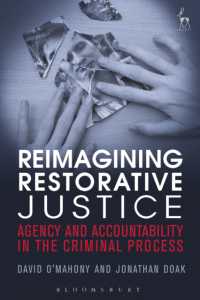Full Description
This collection of papers arrives from the eighth annual symposium between the Chaim Rosenberg School of Jewish Studies of Tel Aviv University and the Faculty of Protestant Theology of the University of Ruhr, Bochum held in Bochum, June 2007. The general theme of the Decalogue was examined in its various uses by both Jewish and Christian traditions throughout the centuries to the present. Three papers deal with the origin of the Decalogue: Yair Hoffman on the rare mentioning of the Decalogue in the Hebrew Bible outside the Torah; E. L. Greenstein considers that already A. ibn Ezra doubted that God himself spoke in the Ten Commandments and states that more likely their rhetoric indicates it was Moses who proclaimed the Decalogue; A. Bar-Tour speaks about the cognitive aspects of the Decalogue revelation story and its frame. The second part considers the later use of the Decalogue: G. Nebe describes its use with Paul; P. Wick discusses the symbolic radicalization of two commandments in James and the Sermon on the Mount; A.
Oppenheimer explains the removal of the Decalogue from the daily Shem'a prayer as a measure against the minim's claim of a higher religious importance of the Decalogue compared to the Torah; W. Geerlings examines Augustine's quotations of the Decalogue; H. Reventlow depicts its central place in Luther's catechisms; Y. Yacobson discusses its role with Hasidism. The symposium closes with papers on systematic themes: C. Frey follows a possible way to legal universalism; G. Thomas describes the Decalogue as an "Ethics of Risk"; F. H. Beyer/M. Waltemathe seek an educational perspective.
Contents
Part I. THE HEBREW BIBLE AND THE NEW TESTAMENT; The Biblical Status of the Decalogue.; The Rhetoric of the Ten Commandments. Seeing Thunder: Narrative Images of the Ten Commandments.; The Decalogue with Paul, especially in his Letter to the Romans.; "You shall not murder", "You shall not commit adultery". Theological and anthropological radicalization in the letter of James and in the Sermon on the Mount.; Part II. LATER DEVELOPMENTS; Removing the Decalogue from the Shem'a and Phylacteries: the historical implications.; The Decalogue with Augustine.; The Ten Commandments in Martin Luther's Catechisms.; The Meaning and Significance of the Commandments according to the Mystical World of Habad Hasidim.; Part III. SYSTEMATIC REFLECTIONS; Law, Commandment - Conditions for the Reception of the Decalogue since the Reformation.; The Ten Commandments in an Ethics of Risk.; The Good, the Bad and the Undecided. Cultural Echoes of the Decalogue. An educational perspective.








